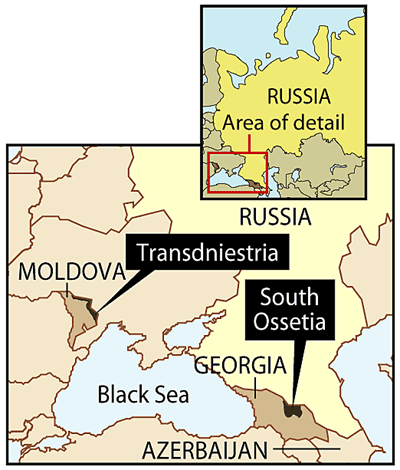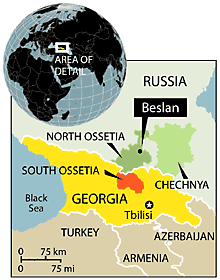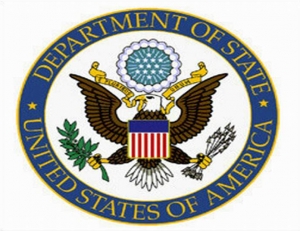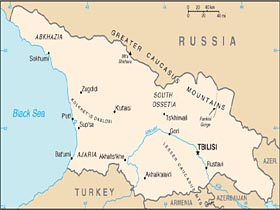The Coming of the Micro-states
By Fred Weir, correspondent of The Christian Science Monitor, June 5, 2006
(Also, see below articles related to emerging states and comments by the EU and US.)
|
From "The Coming of the Micro-states": Experts fear that many "frozen conflicts" around the world - in which a territory has gained de facto independence through war but failed to win international recognition - could reignite as ethnic minorities demand the same right to self-determination that many former Yugoslav territories have been offered by the international community.
The United Nations Charter mentions both the right of "self-determination" of peoples and the "territorial integrity" of states as bedrock principles of the world order. But these principles come into conflict when a separatist minority threatens to rupture an existing country. Russia, which has a score of ethnic "republics," including an active rebellion in Chechnya, has long championed the "territorial integrity" side of the equation.
From the article on Ossetia: This Rhode Island-sized region held a referendum in 1992 after violent clashes with Georgia. But the vote, which passed with 99 percent in favor, went unrecognized by the international community. "Nobody really cares whether the elections are recognized by the international community or not," says a South Ossetian woman, "This is a good chance to show them that we have determined our future for ourselves."
|
MOSCOW - As goes Montenegro, so goes Kosovo, Transdniestria, and South Ossetia?
As Montenegro officially declared independence this weekend, accepting the world's welcome into the community of nations, a handful of obscure "statelets" are demanding the same opportunity to choose their own destinies.
In the latest example, Transdniestria, a Russian-speaking enclave that won de facto independence in the early 1990s, declared last week that it will hold a Montenegro-style referendum in September as part of its campaign for statehood.

Experts fear that many "frozen conflicts" around the world - in which a territory has gained de facto independence through war but failed to win international recognition - could reignite as ethnic minorities demand the same right to self-determination that many former Yugoslav territories have been offered by the international community.
Even more significant than Montenegro's rise to statehood would be the international community's acceptance of Kosovo's bid for independence. The province of Serbia was seized by NATO in 1999. Ongoing talks discussing that possibility are being watched with intense interest by rebel statelets. But as tiny, newly independent states such as East Timor find themselves mired in ethnic violence, international observers are wary of the implications of such a move.
"If Kosovo becomes independent, this precedent will cause further fragmentation of the global order and lead to the creation of more unviable little states," predicts Dmitri Suslov, an analyst with the independent Council on Foreign and Defense Policy in Moscow.
Russia has backed the emergence of several pro-Moscow separatist enclaves in the post-Soviet region, as a means of keeping pressure on defiant neighbors, but has so far been deterred from granting them official recognition by international strictures against changing the borders of existing states. Montenegro's successful May 21 vote of independence from Yugoslavia - recognized by the world community - has encouraged others' thoughts of following the same path.
The United Nations Charter mentions both the right of "self-determination" of peoples and the "territorial integrity" of states as bedrock principles of the world order. But these principles come into conflict when a separatist minority threatens to rupture an existing country. Russia, which has a score of ethnic "republics," including an active rebellion in Chechnya, has long championed the "territorial integrity" side of the equation. But the Kremlin's emphasis, at least regarding some of its neighbors, appears to be shifting.
"If such precedents are possible [in the former Yugoslavia], they will also be precedents in the post-Soviet space," President Vladimir Putin told journalists Friday. "Why can Albanians in Kosovo have independence, but [Georgian breakaway republics] South Ossetia and Abkhazia can't? What's the difference?"
When the Soviet Union collapsed in 1991, all of its 15 major republics gained their freedom and basked in the glow of global acceptance. But within some of those new states, smaller ethnic groups raised their own banners of rebellion. In the early 1990s, two "autonomous republics" in Georgia - Abkhazia and South Ossetia - defeated government forces with Russian assistance and established regimes that are effectively independent but stuck in legal limbo because they remain officially unrecognized, even by Moscow. The Russian-speaking province of Transdniestria, aided by the Russian 14th army, similarly broke away from the ethnically Romanian republic of Moldova. The Armenian-populated enclave of Nagorno-Karabakh in Azerbaijan fell under Armenian control after a savage war; and rebels in Russia's southern republic of Chechnya briefly won de facto independence in the late '90s after crushing Russian forces on the battlefield.
In all of these cases, the international principle respecting the "territorial integrity" of existing states has so far trumped the yearning of small nationalities for their own statehood. Citing that rule, Moscow launched a brutal military campaign in 1999 that has since largely succeeded in reintegrating Chechnya as a province of Russia.
But Russia's relations with Georgia, Moldova, and Azerbaijan have soured in recent years, as those countries have broken from Moscow's orbit and charted a more pro-West course. That, plus the precedents being set in the former Yugoslavia, has led some nationalist politicians in Moscow to demand the Kremlin salvage what influence it can in the region by granting recognition - or even membership in the Russian Federation - to some of those breakaway entities.
Transdniestria has already signed an economic pact with Moscow that will allow the tiny but heavily-industrialized territory to sell its goods in Russia and eventually join the Russian ruble's currency zone. Also in the focus of Russia's changing policies are the breakaway Georgian republics of South Ossetia and Abkhazia.
"Russia needs to be more active in solving the problems of Abkhazia and South Ossetia," says Igor Panarin, a professor at the official Diplomatic Academy in Moscow, which trains Russian diplomats. "Both the people and governments of [these statelets] want to join Russia, and there's every legal reason for them to do so. Polls show the majority of Russians support this, too."
Eduard Kokoity, president of the Georgian breakaway republic of South Ossetia, said last week he will ask Russia to annex his statelet, which has existed in legal limbo since driving out Georgian forces in a bitter civil war in the early '90s. "In the nearest future, we will submit documents to the Russian Constitutional Court proving the fact that South Ossetia joined the Russian Empire together with North Ossetia as an indivisible entity and never left Russia," Mr. Kokoity said.
South Ossetia, with a population of about 70,000, is ethnically and geographically linked with the Russian Caucasus republic of North Ossetia. Experts say there is a local campaign, supported by Russian nationalists, to join the two territories into a new Moscow-ruled republic that would be named "Alania" - the ancient name of the Ossetian nation. "South Ossetia really wants to join Russia, and I wouldn't rule this out as a long-term prospect," says Suslov.
Abkhazia, a sub-tropical Black Sea enclave, expelled its Georgian residents during the 1992-93 civil war, and now is home to about 200,000 ethnic Abkhaz who eke out a living exporting fruit to Russia and welcoming the few Russian tourists that visit each year.
Georgians cry foul, and complain the entire issue is a made-in-Moscow land grab. "South Ossetia and Abkhazia were created as a Bolshevik divide-and-rule device to control Georgia, and they are still being used that way," says Alexander Rondeli, president of the Strategic and International Studies Foundation, an independent think tank based in the Georgian capital, Tbilisi. "What is actually going on is the de facto annexation of these territories by Russia. Since Russia is strong, the Western powers let it do whatever it wants."
Many Western experts argue that the process of dismantling the former Yugoslavia is a unique event, directly supervised by the UN and carried out with a maximum of democratic safeguards. If Russia acts alone in its region, it risks alienating the world and multiplying regional conflicts. "This is a double-edged sword," says Ariel Cohen, a senior researcher at the Heritage Foundation in Washington. "By recognizing Moscow-supported statelets, Russia would perpetuate frictions for decades to come. Post-Soviet borders should remain inviolate. This would save a lot of headaches, first of all for Russia itself."
But for now, the mood in Moscow appears to be hardening. "We disagree with the concept that Kosovo is a unique case, because that runs counter to the norms of international law," Russian Deputy Foreign Minister Vladimir Titov warned in an interview with Vremya Novostei, a Russian newspaper, last week. "The resolution on Kosovo will create a precedent in international law that will later be applied to other frozen conflicts."
###
No Recognition for Breakaway South Ossetia's Vote
By Daria Vaisman, contributor to The Christian Science Monitor, November 10, 2006
TBILISI, GEORGIA – As South Ossetians prepare for this Sunday's presidential elections, there's just one problem: They're the only ones who will recognize the results.
The Nov. 12 vote will also feature a referendum calling for landlocked, breakaway South Ossetia - a tiny scruff of land joining Georgia to Russia's unstable North Caucasus - to reassert its desire for independence.
Spitting distance from Chechnya and linked via a 2-1/2-mile tunnel to North Ossetia - home to Beslan, the site of the 2004 school massacre - this Rhode Island-sized region held a similar referendum in 1992 after violent clashes with Georgia. But the vote, which passed with 99 percent in favor, went unrecognized by the international community.
Once again lacking the world's blessing - and the basic economic necessities for autonomy - this election has been denounced by Georgia and the international community as a bid to join with Russia, which provides the region with overwhelming economic support.
The South Ossetians see things differently.
"Nobody really cares whether the elections are recognized by the international community or not," says a South Ossetian woman, whose job does not authorize her to speak on the record. "This is a good chance to show them that we have determined our future for ourselves."
Almost 70 percent of South Ossetia's approximately 70,000-strong population has been issued newly-minted South Ossetian passports - a voting requirement - and 72 polling stations have been set up.
And while recent signs suggest that approval for Russia and de facto President Eduard Kokoity is waning, there is little doubt that support for independence is likely to be overwhelming.
"It is quite clear that the absolute majority sees their future apart from Georgia," said Oksana Antonekno, a senior fellow at the London-based International Institute for Strategic Studies, who led recent Georgian-South Ossetian peace talks.
With Russian-Georgian relations at a historic low, Georgia has accused Russia of using political and economic tools - such as paying salaries, appointing Russian officials, and issuing Russian passports - as a means to "annex" South Ossetia in order to prevent Georgia from joining NATO, a key goal of Georgian President Saakashvili's administration.
But for now, South Ossetians see Russia as their best bet. They claim prejudice and even ethnic cleansing by Georgians in the 1920s and 1990s, with a recent flare-up in 2004, when now-Georgian Defense Minister Irakli Okruashvili sent special troops into the region in an attempt to reclaim it for Georgia - an attempt that backfired.
"Everyone thinks we're puppets in the hands of Russia, but the situation is not so simple," says Vakhtang Dzhigkaev, economic adviser to Mr. Kokoity. "We want to be open to Europe and America, to show them why we're afraid."

International observers have long said that any conflict here has the potential of spilling over to the rest of the unstable region.
But while both South Ossetia and the international community seek ways to maintain a fragile peace in a region wracked by frequent low-level skirmishes and the constant threat of all-out war, they are at odds over how to secure it. Concerned over the precedent South Ossetia may set in the wake of discussions over possible independence of Serbia's NATO-controlled province of Kosovo, the West has pushed "territorial integrity" - the protection of existing borders - as the only way forward.
The South Ossetians have instead insisted on a hard-line position to independence that has marginalized them internationally but which they say are integral for a long-lasting peace.
"A failure to recognize South Ossetia will turn Tskhinvali [South Ossetia's de facto capital] into Beirut, with unending militarized clashes and tensions in the region," said Alan Dzhusoev, head of Club Open Society, a leading South Ossetian non-governmental organization.
Still, there are hints that some in the administration realize that the status quo cannot go on forever. "We should be open to solutions," Mr. Dzhigkaev says.

U.S. condemns S.Ossetia polls, referendum
The United States have reiterated their support to Georgia's territorial integrity, comdemning the results of the so-called referendum and presidential polls in Georgia's breakaway region of South Ossetia.
Spokesman of U.S. Department of State Sean McCormack has answered the question of a journalist at the daily pess briefing, saying the United States had condemned these polls and referendum before they were held, because they were illegal and international community would never recognize them.
'We don't think that it is -- called a so-called referendum. We have a statement for you. We'll put it out. Send it back to you again,' McCormack told the journalist.
EU Condemns S.Ossetia Polls
The European Union reiterated that it does not recognize the “referendum” and “presidential elections” in breakaway South Ossetia, the Finnish Presidency said on behalf of the European Union on November 13.
“The 'referendum' contradicts Georgia’s sovereignty and territorial integrity within its internationally recognized borders. The EU considers that the situation in South Ossetia did not allow the free expression of the popular will,” the declaration reads.
The European Union reiterated its full support to Georgia's sovereignty and territorial integrity within its internationally recognized borders.
“The European Union considers that the referendum and the elections did not contribute to efforts for peaceful conflict resolution. It calls on all parties to the conflict to strictly respect existing agreements and to return immediately to the negotiating table in order to work towards a speedy and transparent solution of the South Ossetian conflict,” the declaration reads.
###
Kosovo vs South Ossetia
Commentary by Jen Alic for ISN Security Watch - November 15, 2006 - www.isn.ethz.ch
The international community is vague about why Kosovo and South Ossetia cannot be compared, and the answers lie in geopolitics rather than principles of self-determination and international law.

In Western media offerings on South Ossetia's recent referendum for independence from Georgia there is an unwavering tone that suggests the breakaway republic either does not deserve, or should for unexamined reasons, not be granted , independence.
The opposite is true for Western media reports concerning the status of Serbia's UN-administered province of Kosovo. These reports adopt a tone that cheers for and approves of independence.
The international community has long strived for an independent Kosovo and is set to make a decision on the province's status early next year. That decision is most likely going to be independence, though conditional and gradual. At the same time, the international community opposes independence for South Ossetia, citing the unfairness of the Sunday referendum that did not include ethnic Georgians in the breakaway republic.
It has been impossible to find any arguments as to why South Ossetia should not be allowed to pursue self-determination. When questioned on this, Western officials have generally responded by saying that Kosovo and South Ossetia cannot be compared. End of story, no further explanation needed.
But perhaps they can be compared.
Neither South Ossetia nor Kosovo has ever been an independent nation, as far back in history as is rationally warranted to look. Both have at times enjoyed various levels of autonomy. Both have minorities whose rights may not be ensured and whose safety is anything but guaranteed. South Ossetia is home to 14,000 ethnic Georgians, while Kosovo is home to an estimated 120,000 Serbs, who live in fear in UN-guarded enclaves. There is no indication that either minority will be offered adequate protection or adequate rights. And conflict could result from a decision either way.
On Sunday, some 99 percent of South Ossetian voters backed independence from Georgia. The 14,000 ethnic Georgians living in a handful of villages in the breakaway republic were not allowed to vote, as registration required a Russian passport, which all Ossetians have been granted. This was unfair, as the international community has pointed out, but the ethnic Georgian vote would not have changed the outcome.
Furthering the comparison, neither Kosovo nor South Ossetia are necessarily prepared for independence, though Kosovo can expect help from its kin in neighboring Albania and the international community, while South Ossetia can expect some, though likely limited, aid from neighboring Russia. In economic terms, it is unclear how either could support their populations, however small. Industry is for all intents and purposes absent in both locales, while the majority of income is rumored to be made on the black market, largely through arms and drug smuggling.
What has been lacking throughout is an honest debate on these issues, which can easily be compared, despite vague statements to the contrary.
And the honest debate necessarily involves geopolitics.
South Ossetia is a buffer for Russia against the Western-leaning Georgia, while Georgia is a buffer for the US against Russia.
While Russia has played coy with the South Ossetia issue, refraining from recognizing its last declaration of independence in the 1990s and officially supporting Georgia's territorial integrity, it has clearly supported the separatists there. The US must do more than pay lip service to Georgia's territorial integrity, as the country moves toward NATO membership and continues to build its Western alliances.
And of course, there is energy to consider. The Caspian Basin is a place of intense competition, with the US, Russia and China all vying for a stronger foothold. In July, the US$4 billion Baku-Tbilisi-Ceyhan (BTC) pipeline was inaugurated. The BTC pumps Caspian Sea oil to the Turkish Mediterranean, bypassing Russia and Iran. It should supply 1 million barrels of oil per day by 2009. It passes through the Georgian capital, Tbilisi, and also runs rather close to South Ossetia.
BP, formerly British Petroleum, has a 30.1 percent stake in the pipeline. The pipeline was commissioned by a BP-led consortium that includes energy companies from the US, Norway, Turkey, Azerbaijan, Japan, France and Italy. The BTC is a key to Western energy security. Upsetting Georgia - a major player in this energy security - by allowing South Ossetia to declare independence and be internationally recognized would be risky.
As far as Kosovo is concerned, granting independence is much easier. Serbia is of no strategic value to the West, and the international community has no bones about playing with fire there, despite some low-level concerns that granting Kosovo independence could be so unpopular in Belgrade that it would see a return to power of radical forces.
Russia, for its part, would be more than happy to see Kosovo granted independence - this, despite its support for its Serb allies and Serbia's territorial integrity - if only because it would set a precedent for similar moves in South Ossetia, Abkhazia (Georgia's other breakaway republic), and Moldova's breakaway republic of Transdneistr.
So, the question here is not really whether Kosovo or South Ossetia has a right to self-determination - which is indeed a romantic notion that is easy to digest in terms of principles - but why there has been a lack of honest debate at an official level.
|  Home
Home Archives
Archives Home
Home Archives
Archives